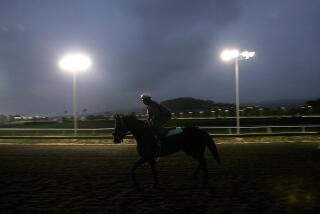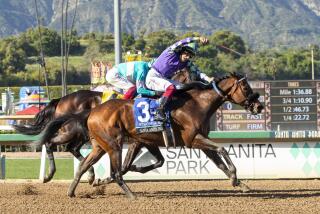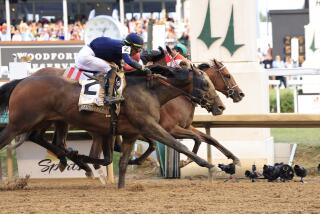Verne H. Winchell, 87; Doughnut Chain Founder and Owner of Racehorses
Verne H. Winchell, who launched a nationwide doughnut franchise business from one drive-through restaurant he opened in 1948 in Temple City, has died. He was 87.
Winchell died of cardiac arrest Tuesday at Summerlin Hospital Medical Center in Las Vegas, the Clark County coroner’s office said. Family members said he collapsed after exercising, which he did daily, on the treadmill at his home.
For the record:
12:00 a.m. Nov. 30, 2002 For The Record
Los Angeles Times Saturday November 30, 2002 Home Edition Main News Part A Page 2 National Desk 4 inches; 175 words Type of Material: Correction
Winchell obituary -- The obituary of Verne Winchell in Thursday’s California section stated that the Longacres Mile horse race was run in Auburn, Calif. The race is run in Auburn, Wash.
Winchell had retired as chief executive and president of Denny’s Inc., which bought Winchell’s Donut Houses in 1968.
He was also a leading horse owner and breeder who started three horses in the Kentucky Derby: Classic Go Go, who finished fourth in 1981; Sea Cadet, who finished eighth in 1991; and Valiant Nature, who finished 13th in 1994.
In all, Winchell bred more than 60 stakes winners and raced more than 40. He had 25 broodmares at 320-acre Oakwind Farm, a Lexington, Ky.-area property that he bought in 1978.
Winchell was born Oct. 30, 1915, in Bloomington, Ill., and his family moved to California when he was 9. After graduating from Alhambra High School and attending Pasadena City College, he worked for General Motors for a time. But wanted to own his own business.
He had already tried two others -- Winchell Music (a jukebox business) and Winchell Motors (used cars) -- when a friend told him there was a high profit margin on doughnuts. Winchell took a $27,000 stake and turned a piece of commercial property he owned into his first Winchell’s doughnut shop.
“That first shop did very well, so I opened a couple more,” he told The Times in 1960. “They didn’t do so good.”
Soon, however, the doughnut shops took off, and Winchell expanded his operation throughout California. In 1976, according to BusinessWeek magazine, sales at Winchell’s nationwide were $99 million, although the chain was by then a distant second to Dunkin’ Donuts.
By that time, Winchell had sold his operation to Denny’s in exchange for stock. In 1970, he became chairman of the troubled Denny’s Restaurants (later Denny’s Inc.).
Winchell was generally credited with bringing the company back to life with his low-key, professional style.
He said the key to his success was careful management, good merchandising and advertising, proper locations and quality products.
“We decided to stop selling franchises in 1971 and instead concentrate on earning a profit from our operations,” he said about his oversight of Denny’s. “Quick profits from the sale of franchises didn’t appeal to us anymore.”
In 1984, Winchell left the doughnut and restaurant business when he sold his stock in Denny’s for a reported $600 million.
Still, he was thrilled several years later to win $110,000 with his 4-year-old colt Wild Wonder at Longacres Mile in Auburn, Calif. “I’m happy I came up here, not only to win, but just being here,” he said as he took his place in the winner’s circle.
Winchell became interested in horses in the 1930s. One of his first winning horses was Mr. Eiffel, for which he paid $10,000 only to see it laid up for 10 months. But the horse came back to win $57,000 in two races.
Over the years, Winchell owned horses named Donut King (also his own nickname), Mr. Tower, Mr. America, Ancient Mariner, Mira Femme, Tight Spot, On Target, Call Now, Amerique, Future Quest, Olympio, Ronnie’s Baby and Sea Cadet.
Donut King, the first horse Winchell bought at auction, was among the favorites for the 1954 Kentucky Derby but was injured the week of the race and didn’t run.
“That would have been our best chance to win,” said Winchell’s longtime trainer, Ron McAnally.
Ronnie’s Baby, which was bred by Ronald Reagan and purchased from Desi Arnaz, didn’t amount to much.
Sea Cadet, for whom Winchell paid $2,800 in 1989, won more than $1.7 million during the 1990s.
Besides horse racing, Winchell also enjoyed movies -- he told The Times his favorite was “Casablanca,” although you “can’t beat the older violent movies like ‘Terminator’ for the sound of the explosions.”
He and his wife, Joan, built a $60,000 screening room -- if you didn’t count the additional custom work -- in their San Marino home. They called the home theater The Bijou.
Winchell had survived at least one other heart attack. He told the story that 40 years ago, when his daughter was driving him to one of his doughnut shops in Alhambra, he suffered an attack in the car.
“We were approaching an automobile accident where an ambulance had already come,” he said. “The ambulance took both me and someone from the accident to the hospital. If that ambulance hadn’t been there, I was told later, I never would have made it.”
A longtime resident of Las Vegas, he is survived by his wife; two sons, Richard and Ronald; two daughters, Christina Winchell and Linda Schumacher; five grandchildren; and nine great-grandchildren. Sisters Barbara Ogden and Eloise Wills, both of Los Angeles, also survive him.


